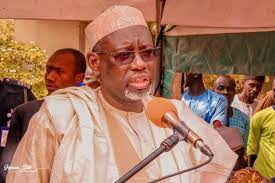The Defection Drama: A Shift in Jigawa’s Political Landscape
The political scene in Jigawa State witnessed a dramatic turn of events as Governor Umar Namadi of the All Progressives Congress (APC) welcomed a group of defectors from the People’s Democratic Party (PDP). This act, symbolically marked by Namadi tearing up the defectors’ PDP membership cards, sent ripples through the state’s political landscape, underscoring the ongoing power dynamics between the two major parties. Namadi’s gesture, accompanied by his assertive declaration that the PDP’s influence in Jigawa was waning, was interpreted as a bold statement of the APC’s growing dominance. He assured the new members of equal treatment within the APC, emphasizing the party’s principles of inclusivity and shared purpose. The defectors, represented by Nasir Alhassan, attributed their decision to the PDP’s perceived leadership crisis and lack of direction, contrasting it with the APC’s apparent stability under Namadi’s leadership.
The defection narrative, however, took a contentious turn with the response from Jigawa State PDP Chairman, Ali Diginsa. He vehemently denied the scale of the defection, questioning the credibility of the individuals involved and expressing skepticism about their motives. Diginsa’s retort went beyond mere denial, as he directly criticized Namadi’s actions, deeming the tearing of membership cards as undignified and unbecoming of a governor. He emphasized the PDP’s historical significance and its enduring legacy in Nigerian politics, suggesting that the party’s influence remained substantial despite the defections. The PDP chairman’s demand for an apology from Namadi added another layer to the unfolding political drama, highlighting the symbolic importance attached to party membership and the perceived disrespect shown through the act of tearing the cards.
This incident in Jigawa State encapsulates the broader political dynamics at play in Nigeria. The movement of politicians and their supporters between parties is a recurring theme, often influenced by perceived opportunities, shifting alliances, and personal ambitions. The public display of switching allegiances, as witnessed in Jigawa, serves as a potent symbol of the fluidity of political loyalties and the ongoing struggle for power between rival parties. The contrasting narratives presented by the APC and PDP in this instance underscore the importance of perception and the strategic use of symbolism in shaping public opinion. While the APC portrays the defections as a sign of its growing strength and the PDP’s decline, the PDP downplays the significance of the event and attempts to portray the APC’s actions as disrespectful and desperate.
The episode also raises questions about the motivations behind political defections. Are they driven by genuine ideological shifts, pragmatic considerations, or personal gain? The PDP chairman’s assertion that "no serious and sensible person would consider joining the APC" reflects a common tactic of discrediting defectors by questioning their judgment and integrity. Conversely, the defectors’ stated reasons for leaving the PDP—leadership crisis and lack of direction—point to internal party dynamics and the perceived inability of the party to effectively address the needs and aspirations of its members. These competing narratives highlight the complex interplay of factors influencing political decisions and the challenges of discerning the true motivations behind such moves.
The symbolic act of tearing up membership cards adds a layer of theatricality to the political maneuvering. While Namadi likely intended it as a powerful visual representation of the defectors’ break with the PDP and their embrace of the APC, it also provided fodder for the PDP to criticize his conduct and portray him as disrespectful. This incident underscores the importance of symbolism in politics and the potential for seemingly small gestures to carry significant meaning and provoke strong reactions. The PDP’s demand for an apology further emphasizes the symbolic value attached to party membership and the perceived transgression of destroying these symbols of affiliation.
Looking ahead, the political landscape in Jigawa State remains dynamic. The defections, regardless of their actual scale, represent a shift in the balance of power, at least perceptually. The APC will likely leverage this event to bolster its image as the dominant force in the state, while the PDP will strive to minimize the damage and rebuild its support base. The long-term impact of these developments will depend on how effectively each party navigates the evolving political landscape and responds to the changing needs and aspirations of the electorate. The incident serves as a microcosm of the broader political dynamics in Nigeria, where shifting alliances, personal ambitions, and the strategic use of symbolism play a significant role in shaping the course of political power.














